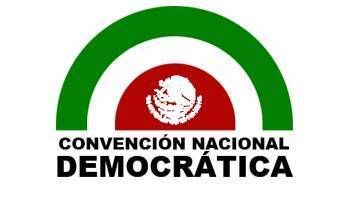 Protesters are claim another symbolic victory as President Vicente Fox changes site of the annual Mexican Independence day grito.
Protesters are claim another symbolic victory as President Vicente Fox changes site of the annual Mexican Independence day grito.
President Vicente Fox sidestepped another showdown with leftist firebrand Andres Manuel Lopez Obrador, announcing Thursday that he won’t hold tonight’s traditional Independence Day celebrations in Mexico City’s massive central plaza.
The first symbolic victory occurred when legislators from the Party of the Democratic Revolution (PRD) halted President Fox from delivering the state-of-the-nation address to Congress, which was the first time in Mexican history this ever happened to a standing president. Another symbolic victory occurred when AMLO supporters forced President-elect Felipe Calderón, to use the city’s bullring for his victory rally, a small venue that could be easily secured.
Andrés Manuel López Obrador (AMLO) and his supporters had vowed they would upstage Fox by declining to take part in today’s annual salute of “Viva Mexico!”. They are planning to take over the Zócalo for their own celebration, which Alejandro Encinas, Mexico City’s current mayor and a member of López Obrador’s party, will lead in the city’s festivities.
Fox has decided he will give the symbolic “grito” – the liberty cry — in the to the small, central town of Dolores Hidalgo, which is built 170 miles northwest of Mexico City, where Roman Catholic priest Miguel Hidalgo launched the first call for independence from Spain in 1810. The area is also located in Fox’s home state of Guanajuato, a bastion of support for his moderate National Action Party (PAN).
On Saturday, AMLO, the PRD and their supporters will hold their National Democratic Convention, which they expect that more than 1 million volunteer delegates from all 31 states and the Federal District to show up. Former López Obrador campaign coordinator Jesús Ortega said that almost 800,000 delegates had been registered since the meeting were announced back on Aug 19.
AMLO political future hangs on the outcome of this Convention. AMLO will be set the course for its movement in opposition to Felipe Calderón at the Convention on Saturday.
“The task he (López Obrador) faces is that of speaking out on the same issues that Calderón will be making decisions on,” historian and political observer Lorenzo Meyer, a member of the Colegio de México, told EFE.
The academic said he saw López Obrador creating a form of “shadow Cabinet” that would serve as a “mirror” to criticize the Calderón administration.
Meyer said the convention could also lead to the creation of several organizations, some backed by the parties making up the leftist coalition, as well as unions, grassroots groups and non-governmental organizations, that would take action within Mexico´s institutions.
It would be interesting to see what stance AMLO will take this weekend. José Antonio Crespo, of the Center for Economic Research and Instruction showed that if AMLO chosen a radical approach he “could start to become marginalized and lose influence in decision making.” However, if AMLO chosen a moderated approach he “could have a strong influence on the PRD” and bolster its position in Congress.
Despite the thousands of protesters in the streets, unprecedented disruptions, no violent outbreaks have occurred forcing the government remain peacefully tolerant. There is no doubt that López Obrador and his advisers have purposely avoided getting involved in situations that would start violence. So far, they voted not to march to a heavily guarded congressional building the day President Fox was to force his annual report to Congress and AMLO has vowed not to interfere with the military parade during Independence Day celebrations this weekend. The avoidance of force clearly has limited the government’s ability to react, which in turn makes AMLO good in the eyes of his supporters and that sympathy to his cause.
On the US side, the House of Representatives voted 283-138 for a bill providing for the construction of a 700-mile fence along the US-Mexico border designed to curb anybody crossing the border. The Secure Fence Act of 2006 [PDF text] also allows the Department of Homeland Security to take control of the border in 18 months and it will also give border patrol agents additional authority to stop fleeing vehicles. The bill, however, does not provide the funding to pay for the construction of the “reinforced fencing,” which is estimated to be between $2 and $7 billion. This is rather a curious move by Congress considering the latest news regarding the immigration debate occurred when Senator Bill Frist announced that immigration reform was “impossible to pass” but would focus on border security.
U.S. congressional leaders are giving up on broad immigration legislation that would legalize millions of illegal immigrants and instead will concentrate on border security ahead of the elections, Senate Majority Leader Bill Frist said
This announcement occurred right after the Mexican Electoral Court ruled Calderón winner. Now the House of Rep passes a hallow bill for the construction of a 700-mil border wall. Is this a message?
Back in March, I wrote that the relationship between Mexico and the US have been strained because Mexico became a signatory to the International Criminal Court making them the 12th country from the Latin America-Caribbean area to be punished under the U.S. American Service-Members’ Protection Act. The law prohibits military assistance to states that have not signed “Article 98” agreements. An “Article 98” agreement is the agreement between the US and those states who pledge not to seek the prosecution of US citizens in the ICC. In March Houston Chronicle, announced that the authorities were imposed without an officially notifying Mexico.
One does have to wonder how much of Congress’ actions are spurred on by the events unfolding in Mexico. Building a border wall will only make matters worse between the two countries. The world waits for tomorrow.


